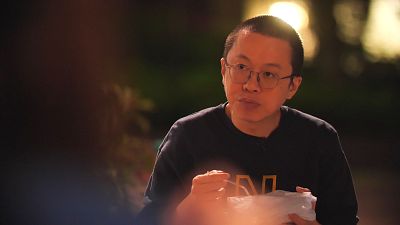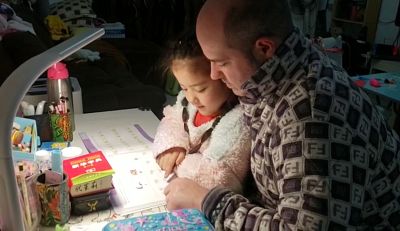"Of course, it makes sense to the brain," Dr. Alfred Wong told NBC News. "But doesn't make sense to the heart."
HONG KONG — Sitting 10 feet apart on a bench in Hong Kong's Tuen Mum Park, Dr. Alfred Wong and his pregnant wife briefly remove their protective masks before tucking into their take-out dinners and talking about their days.It is a brief respite and return to normality for Wong, 38, a member of the "dirty team" at the Tuen Mun Hospital nearby. There, he is tasked with treating patients infected with the coronavirus.Wong told NBC News that he was so concerned about his wife and unborn child that he would not go any closer to her than 10 feet. Physical contact is off limits and he has been staying at a hotel near the hospital rather than going home after work, he said. As a result, he said he mostly communicated with his wife, who did not wish to be named due to the political sensitivities surrounding her husband's work, by text message."Of course, it makes sense to the brain," Wong said. "But doesn't make sense to the heart."Wong, who volunteered to join the "dirty team" said he did feel "guilty" at times but he was proud to be "keeping this city healthy." His patients needed him, he added.His story is not unique among the dirty team. Made up of 15 junior and senior doctors with multiple specialties, they are tasked with treating those diagnosed with COVID-19 and those suspected of having it.Most other Hong Kong hospitals have similar teams in place, Wong said.At the time of publication, two people had died from the respiratory illness in the semi-autonomous city, and there have been 103 confirmed cases.
Doctors take no risks, wearing protective equipment including masks and visors."We have our own office. We don't eat inside canteens. We do takeaways. And after work, we don't go home," Wong said. "Most of our colleagues have children or old parents at home. It's basically the same thing for every one of us."**TUNE IN: On Assignment with Richard Engel, Outbreak airs on Sunday Mar. 8 at 10 p.m. ET, only on MSNBC.**Less than 600 miles away in Wuhan — the Chinese city where the disease is believed to have originated — Benjamin Wilson has the opposite problem. A English teacher and restaurateur from Alexandria, Louisiana, he can only spend time with his wife, Lulu, 36, and 7-year-old daughter, Jasmine."Trapped," Wilson, 38, told NBC News. "Couldn't leave if we wanted to."He said that he felt like "astronauts being in space," as they were "completely cut off and isolated" in their apartment."It has fallen into a routine," he added. "It's not a bad thing, but God, it's boring."In an attempt to quarantine the disease, China's government locked down the 11 million residents of Wuhan in late January, imposing travel restrictions that prevented people from entering and leaving the city.These were eventually imposed in all of the other 15 cities in Hubei province, where Wuhan is, affecting almost 57 million people.Wilson, who met his wife in Wuhan after he moved to the city almost 17 years ago to learn Mandarin, said he had tried to get his family on one of evacuation flights from Wuhan that were organized by the U.S. Department of State last month.
While Jasmine does have a U.S. passport, he said Lulu did not have an American or a Chinese passport and would have been unable to travel.He said he had tried to get clarification on "whether or not the U.S. would issue any kind of emergency travel visa for my wife, in order to leave with us, because I didn't want to leave her here, and I definitely didn't want to try and separate our family."Having failed to do so, he said both Lulu and Jasmine and their Scottish terrier, Darwin, had not left their apartment since Jan. 19. Only he ventured outside to go shopping for food and on his return, he said he had "a whole procedure, for the clothes that I wear.""As soon as I step in, all the clothes, immediately spraying and cleaning with bleach, and then they go outside to hang up in the sunshine, or they're washed with a detergent that has antibacterial soap," he said.Inside the apartment, his days are spent talking to his family stateside on the phone, playing with his daughter and trying to organize for supplies to be shipped."A few of us that are here, in the community, are trying to pool resources and share things," he said. "I've shared some of my masks with other expats."In mainland China, more than 3,000 people have died from COVID-19, and almost 80,500 cases have been confirmed.Wilson said more people were taking precautions and using whatever protective equipment was left."I see a lot more people following and doing what I've been doing, wearing gloves, covering their body, having a special suit — you know a disposable hazmat suit or some kind of cloth to go around your clothes," he said."I mean if I had something like that I definitely would wear it."Delara Shakib reported from London.













